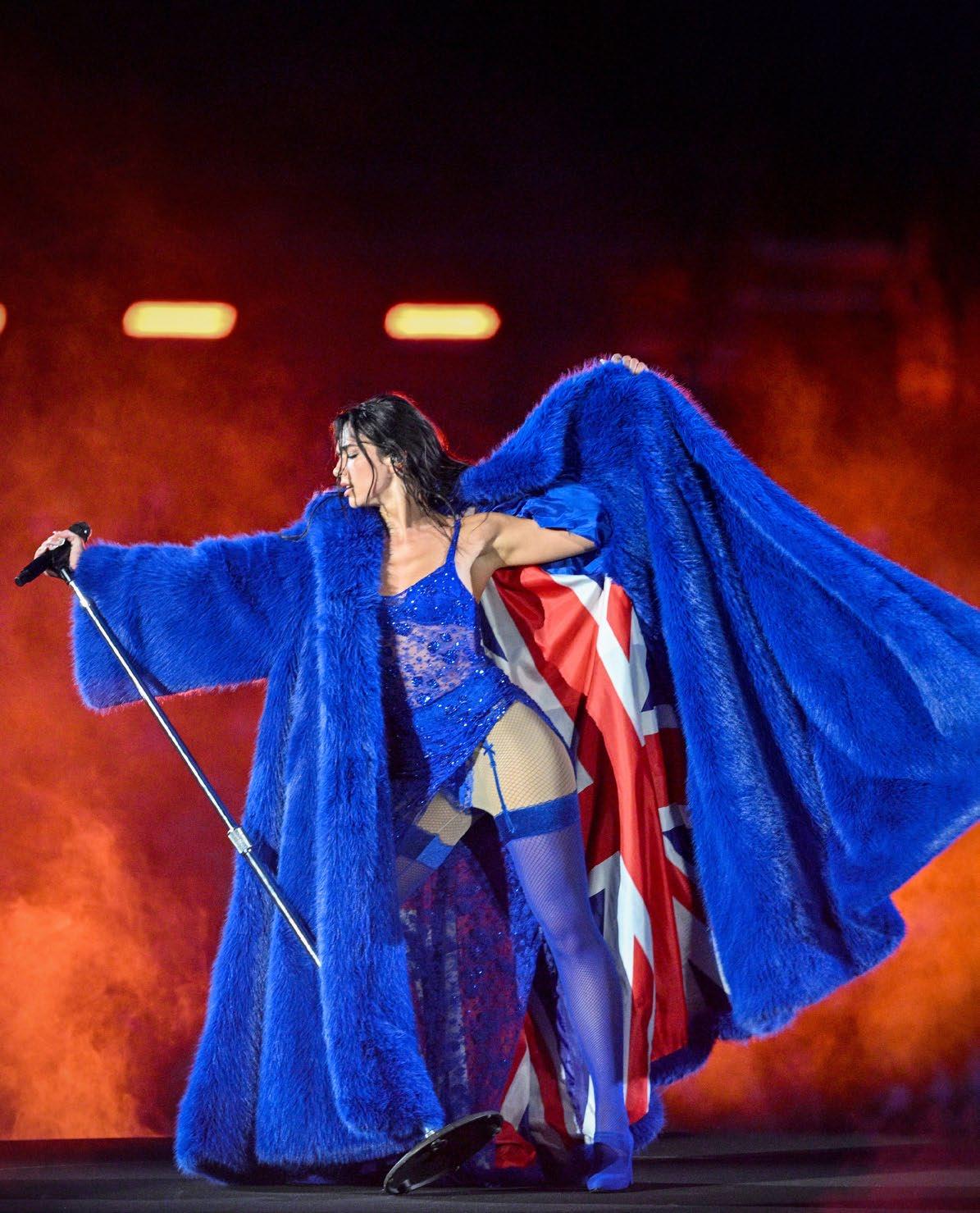

RADICAL AGENDA
LEVITATES TO STADIUM LEVEL
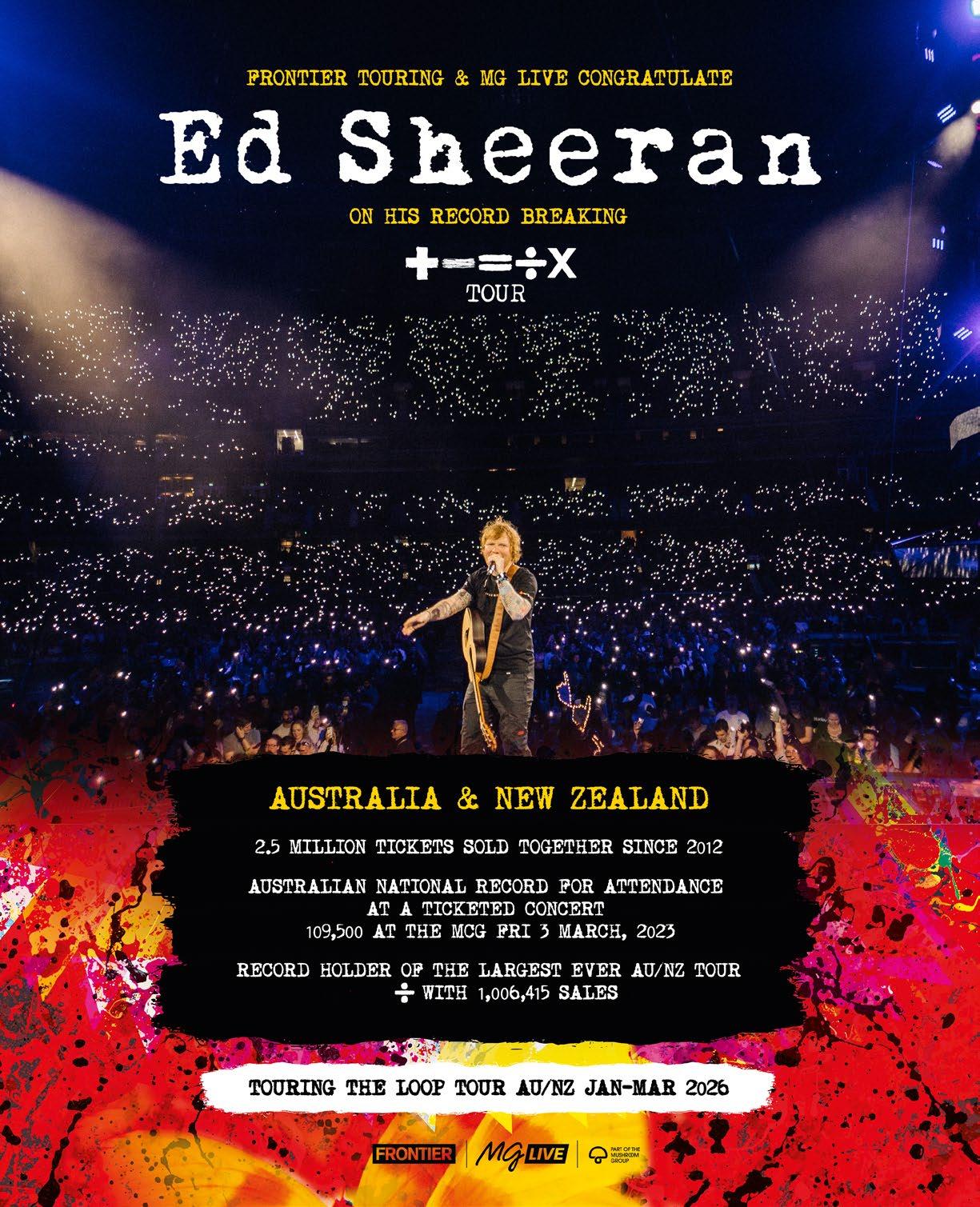


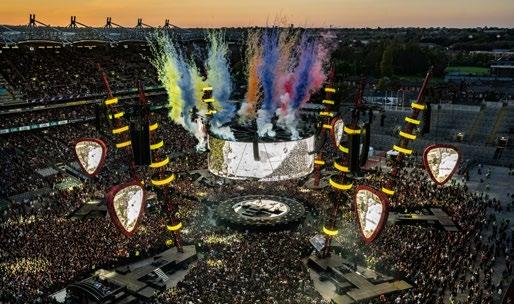

COMMENTS & COLUMNS
32 Radical Agenda
Gordon Masson talks to the incredible team behind Dua Lipa’s Radical Optimism World Tour 40 The Caucasus
Lisa Henderson explores the burgeoning touring territories of Armenia, Azerbaijan, and Georgia
Sheer Brilliance
As Ed Sheeran’s Mathematics tour ends its four-year run, Hanna Ellington talks to the people behind the logistical challenge of this expansive outing
Urban Mitha
German promoter Ben Mitha marks two decades in live music
You Should be Dansking
Our market expert, Adam Woods, revisits one of the healthiest live markets in the world
14
Fix the Power, Fix the Food, Fix the Travel
Claire O’Neill and Dale Vince OBE from Grid Faeries x Ecotricity talk festival power and more
The Pain is Real on Both Sides
Tamás Kádár addresses artistic freedom versus censorship in the wake of Hungary banning Kneecap from performing at Sziget Festival
Spotlight on Hong Kong
We take a look at Hong Kong in the wake of the newly opened Kai Tak Sports Park venue, which has reopened the territory for stadium shows 72
Members’ Noticeboard
ILMC members’ photographs
Your Shout
“Forty years on, what are your memories of Live Aid and its lasting impact?”
Thousands of professionals read IQ every day. Make sure you get the whole picture…
Cover photo: Dua Lipa’s Radical Optimism Tour at Wembley Stadium, 20 & 21 June © Sam Hussein – Getty
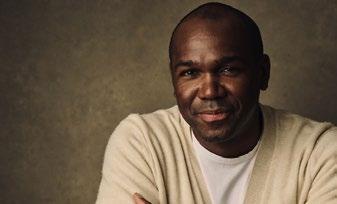

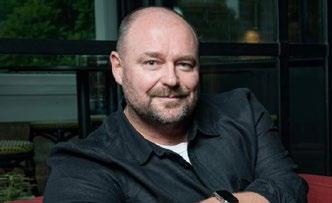
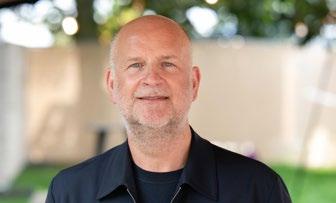
EXECUTIVE TURNTABLE: MOVERS & SHAKERS
There were changes at the top of AEG Presents in the UK and APAC in a busy few weeks of executive appointments.
Jim King was named CEO of AEG Presents UK and European festivals, with Steve Homer transitioning to a new position as president of UK touring, as part of King’s team.
King, who was most recently CEO of European Festivals, will add “oversight of the company’s UK concert promotion business” at all levels to his remit, while Homer, who joined AEG initially as co-CEO in 2016 and took sole charge in 2022, will focus on AEG UK’s touring activities.
“Jim’s appointment is both a recognition of his achievements and a key strategic step as we continue aligning and expanding our UK and European business strategies,” says Adam Wilkes, president and CEO of AEG Presents Europe and Asia Pacific, to whom King will report. “In addition, I’m thrilled that Steve will pivot to his new role, where he can focus on what he does best – bringing his talents as a gifted concert promoter to our newly realigned business.”
Separately, Frontier Touring chief Dion Brant has been appointed as president and CEO of AEG
Presents Asia Pacific.
The experienced Melbourne-based executive will be tasked with spearheading AEG’s continued growth and development throughout Asia and working to further strengthen the company’s footprint and strategic direction across the wider Asia Pacific region. Brant will continue in his roles at Frontier – both as CEO and on the firm’s board of directors.
“Dion is a highly respected executive who has played an integral role in our success,” says Wilkes. “His leadership at Frontier has been transformational, proving he’s a steady hand capable of guiding our business into the future.”
Elsewhere, former AEG executive Jessica Koravos is joining Pophouse, the pioneering global entertainment and music investment firm behind ABBA Voyage, as its new CEO.
Koravos, who will succeed Per Sundin in the role in January 2026, most recently worked as president of Oak View Group International and The Really Useful Group and was also a member of the ABBA Voyage board. She will revert to non-executive chair of OVG International – a position she held from 2018–2023.
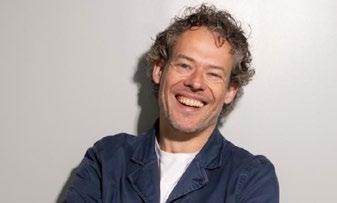
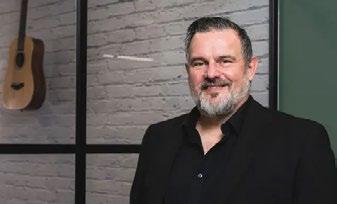
“This leadership transition represents a pivotal moment in Pophouse’s evolution and underscores the company’s mission to redefine the entertainment landscape,” says Pophouse chair Lennart Blecher. “Jessica brings a proven track record of driving sustained growth across entertainment and live production ventures on a global scale, and her leadership in securing international licensing partnerships and delivering iconic IPs to audiences throughout Europe, Asia, and the US aligns perfectly with our ambitious expansion goals.”
Additionally, United Talent Agency has heralded an “exciting new chapter” with the appointment of partner Darnell Strom as head of its UK office.
Based in London, Strom will oversee UTA’s UK operation and continued expansion into key markets across Europe, the Middle East, and Africa. He was previously the company’s head of culture and commerce, having joined from CAA in 2019.
According to UTA, the newly created role underlines its aim to “evolve London into a major international hub” for the firm after opening its UK base two years ago. Strom’s leadership will focus on “strengthening integration and connectivity” across UTA’s European operations, “unlocking new business opportunities and driving growth throughout the region.”
“This marks an exciting new chapter for UTA,” says CEO David Kramer. “Darnell has long been a connector across departments, industries, and geographies. His deep relationships and creative vision make him uniquely suited to lead this next phase of our international expansion.”
Lastly, resale platform TicketSwap has named Jan van Casteren as its new CEO after the company’s co-founder Hans Ober stepped down from day-to-day operations after more than 12 years. Van Casteren previously served as head of Europe at Flexport.
Thousands of professionals read IQ every day. Make sure you get the whole picture… SUBSCRIBE HERE
Darnell Strom Dion Brant
Steve Homer
Jessica Koravos
Jim King
Jan van Casteren
“There’s no good answer. Because the pain is real – on both sides”
TAMÁS KÁDÁR | SZIGET FESTIVAL
The planned performance of the Northern Irish rap trio Kneecap at our festival has stirred up a storm in recent weeks – not because of their music, but because of the question of whether we would allow them to perform or not. That decision has now been taken away from us by the government announcing that they have banned the group from entering Hungary.
This time, public discourse was not about the band’s original agenda, which addresses Irish-British historical tensions, but the current Israeli-Palestinian conflict.
It is becoming increasingly clear that there is no good answer to this question –and perhaps that is the most honest admission we can make.
Although Kneecap already performed at Sziget without incident in 2022, they gained global prominence this spring following Coachel la Festival when, among other things, “F*ck Israel” was projected onto a screen during their performance. 2023 footage then emerged showing one of them waving a Hezbollah flag on stage, leading to a member of the band being arrested and charged by British police.
people and strongly criticising Israeli actions is not antisemitism but a humanitarian duty. The two interpretations coexist – and seem irreconcilable.
Sziget’s response – that we are committed to artistic freedom, we are not and will not be censors – is clear. However, this answer does not resolve the contradiction. Because even if a festival claims not to be political, its performers carry political messages. And when these messages tear open deep wounds, whether through my own example as a descendant of Holocaust survivors or concerning the fate of civilians living in Gaza, it cannot be dismissed by saying, “It’s just music.”
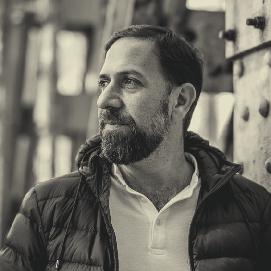
In this situation, every decision will hurt someone. If we had cancelled the performance, it would have acted as censorship and reinforced the feeling that Palestinian solidarity has no place in public. If we had kept it, then those who believe Kneecap represent one side rather than peace would have felt betrayed – in a conflict that is already unbearably polarised.
Kneecap are not a typical band. They are political, raw, with lyrics mixing motifs of English colonisation, oppression, resistance, building on their own Northern Irish experiences. Their performances incorporate their support for Palestinians.
The band has said: “Let us be unequivocal: we do not, and have never, supported Hamas or Hezbollah. We condemn all attacks on civilians, always. It is never okay. We do not give a fuck what religion anyone practices. We know there are massive numbers of Jewish people outraged by this genocide just as we are…”
Kneecap support the Palestinian cause, and they do so in their provocative way. I know that many people – including artists and individuals that I deeply respect – felt that by not banning their performance, Sziget itself was taking a political stance on an issue that deeply divides public opinion.
Critics argue that our decision not to remove them was problematic, not only because of the band’s message but because a new wave of antisemitism is sweeping the world. The support for Kneecap, say some, fits into this pattern – whether intentionally or unintentionally.
Others believe that highlighting the suffering of the Palestinian
I believe that Sziget in this case could only rely on its deepest values. We do not tolerate hate speech in any form, and this includes antisemitism. We clearly communicated this to the band. At the same time, we remain committed to the spirit of freedom of speech, which has been a core value of the festival for 30+ years.
The planned Kneecap performance made one thing very clear: globalised culture does not know how to handle the world’s injustices while providing space for art. And the audience does not know how to be simultaneously empathetic, sensitive, and yet open.
Prior to Sziget, Ádám Schönberger from Bankito Festival wrote: “Although the outrage surrounding Kneecap and their concert is completely understandable, the solution is not a restriction of generally accepted freedoms. A community renegotiation of language and concepts is essential – otherwise, only violent polarisation will remain, turning public discourse into trench warfare.”
We had hoped to play our part in this and are very disappointed that the government’s decision took that away from us.
Summing up, there’s no good answer. Because the pain is real – on both sides. The names of the dead do not compete with each other.
Tamás Kádár is the CEO of Sziget Festival in Budapest
Thousands of professionals read IQ every day. Make sure you get the whole picture… SUBSCRIBE HERE
In early September, 1,000 of the top agents and festival bookers from around the world will meet in London for the 11th edition of the International Festival Forum, which is presented this year in association with OFFLIMITS Music Festival.
Built around a Central London campus, key updates to this year’s event include a date change that brings the event forward to better align with festival booking windows and a significantly expanded provision of networking and deal-making spaces.
Alongside booking agency pop-up offices, speed meetings, and an augmented conference programme, the wellbeing and social side of life hasn’t been forgotten, with on-site massages, an arcade game competition, and an in-house barista, alongside numerous parties and happy hours.
IFF takes place from 9–11 September, and while the event expects to sell out in advance, as most previous editions have, there’s still time to secure one of the remaining passes.
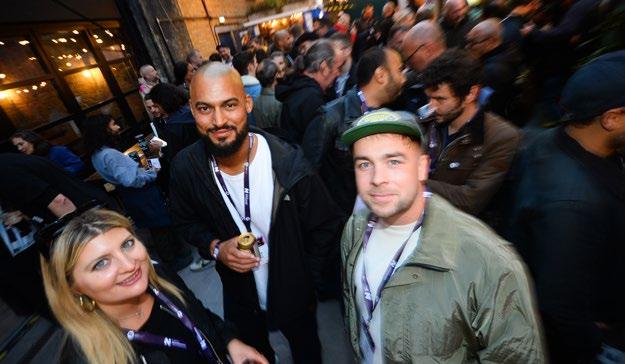
WHO’S SHOWCASING?
The full showcase schedule will be announced online in early August, but previous IFF showcases have included early performances from Lewis Capaldi, Tom Grennan, Idles, Yonaka, Sam Ryder, Raye, Loyle Carner, and Dermot Kennedy.
Agencies curating showcases this year include ATC Live, Primary Talent International, ITB, Runway, and Motion.
Wednesday evening will see the IFF International Showcase hosted by The Spanish Wave and Music From Ireland, whilst on Thursday evening, IFF will bow out with an MVT-presented showcase profiling the hottest up-and-coming British talent.
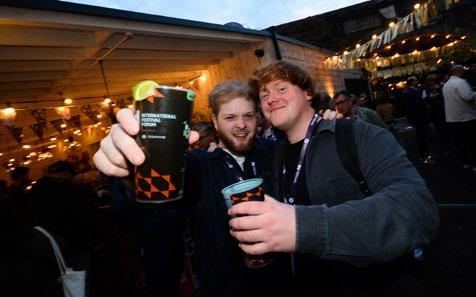
HOW DO I ATTEND?
IFF is an invitation-only event aimed solely at booking agents and festivals. If you are not already on the invitation list, sign up for updates at iff.rocks/ register. For more information about attending and how to get an invite, email laura@ilmc.com.
FULLSCHEDULEONLINEIFF
WHAT DOES AN IFF PASS INCLUDE?
● Entry to all showcases & parties
● Access to all conference sessions
● Access to speed meetings & genre-specific networking events
● Lunches, dinners, & refreshments
● Access to the IFF Networking Scheme in order to contact other delegates ahead of the event
● A copy of the IFF Conference Guide, which includes contact info for all delegates
● An exclusive discount off your IQ Magazine subscription
NETWORKING & DEALMAKING
The purpose of IFF has always been to bring buyers and sellers together for key conversations at the right time of the year: it’s all about doing deals. So, in response to feedback from delegates, IFF will be turbocharging on-site networking in 2025. The campus layout is new and improved, with a greatly expanded area for ad hoc meetings and get togethers, with specialty coffee available on site each day. The number of speed meeting sessions has expanded from one to three and a range of happy hours and genre-specific mixer sessions all add up to numerous ways to meet up and do business.

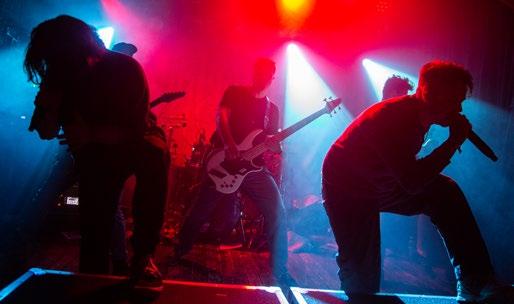


IN ASSOCIATION WITH
We’re very happy to welcome IFF’s new title partner, OFFLIMITS Music Festival. The event’s inaugural edition earlier this year – produced by Theory Eleven Entertainment and delivered in collaboration with Miral and DCT Abu Dhabi – welcomed over 30,000 attendees and featured global acts including Ed Sheeran, OneRepublic, Faithless, and Kaiser Chiefs.
The OFFLIMITS team are keen to catch up with delegates during IFF.







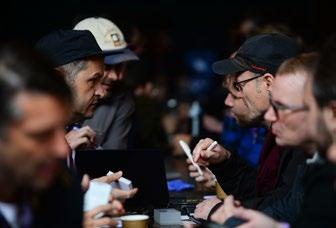

CONFERENCE PROGRAMME
This year’s IFF conference programme is bigger and more diverse than ever, ranging from headline sessions and keynote interviews through to practical workshops and seminars.
WEDNESDAY
Wednesday kicks off with top agents and festival leaders running the rule over The Festival Season 2025 and culminates with a keynote interview with Jim King, CEO of AEG Presents UK and European festivals. Added to the programme is a run of intimate workshops and discussions, including sessions on diversifying festival income streams, improving safety at events, amplifying values through festivals, and an expert guide on how AI and tech is set t o transform the running of events.
THURSDAY
Four leading agents kick off Thursday’s conference programme in a session unpacking the festival strategy of leading artists, while EXIT Festival presents a special session looking at the challenges of running an event in the teeth of political adversity. Workshops and seminars throughout the morning will look at key issues such as how festivals can still be a key driver of societal change and the latest developments in sustainability for festivals. And in the afternoon, ROSTR CEO Mark Williamson will be unveiling the ROSTR x IQ Europe’s Festival Summer 2025 Report in a special session, with an analysis of the global agency landscape for IFF delegates.






Looking back over the 18-year history of ’s New Bosses list makes for impressive reading, as many alumni have indeed gone on to become some of the industry’s global leaders.
In association with Futures Forum, the list relies upon you, our readers, to nominate those individuals, aged 30 and under, who have impressed you most with their approach to the industry and who are making a difference in the way we conduct business. The names that follow also form the shortlist for the Tomorrow’s New Boss Award, which will be handed out during The Arthur Awards at ILMC in February.
The class of 2025 is among the most impressive. As you will discover on the following pages, this year’s nominees come from a variety of disciplines in live entertainment, with many already leading teams that are making the industry a better, more efficient landscape for fans, artists, and the myriad of sectors that support them.
As usual, due to limited space, these profiles are heavily edited versions of the interviews we conducted. However, thanks to the wonders of our website – iqmagazine.com – we’ll be publishing the full Q&As throughout August, so keep an eye on the website to find out more.
Congratulations to everyone selected as one of this year’s New Bosses!
Thousands of professionals read IQ every day. Make sure you get the whole picture…
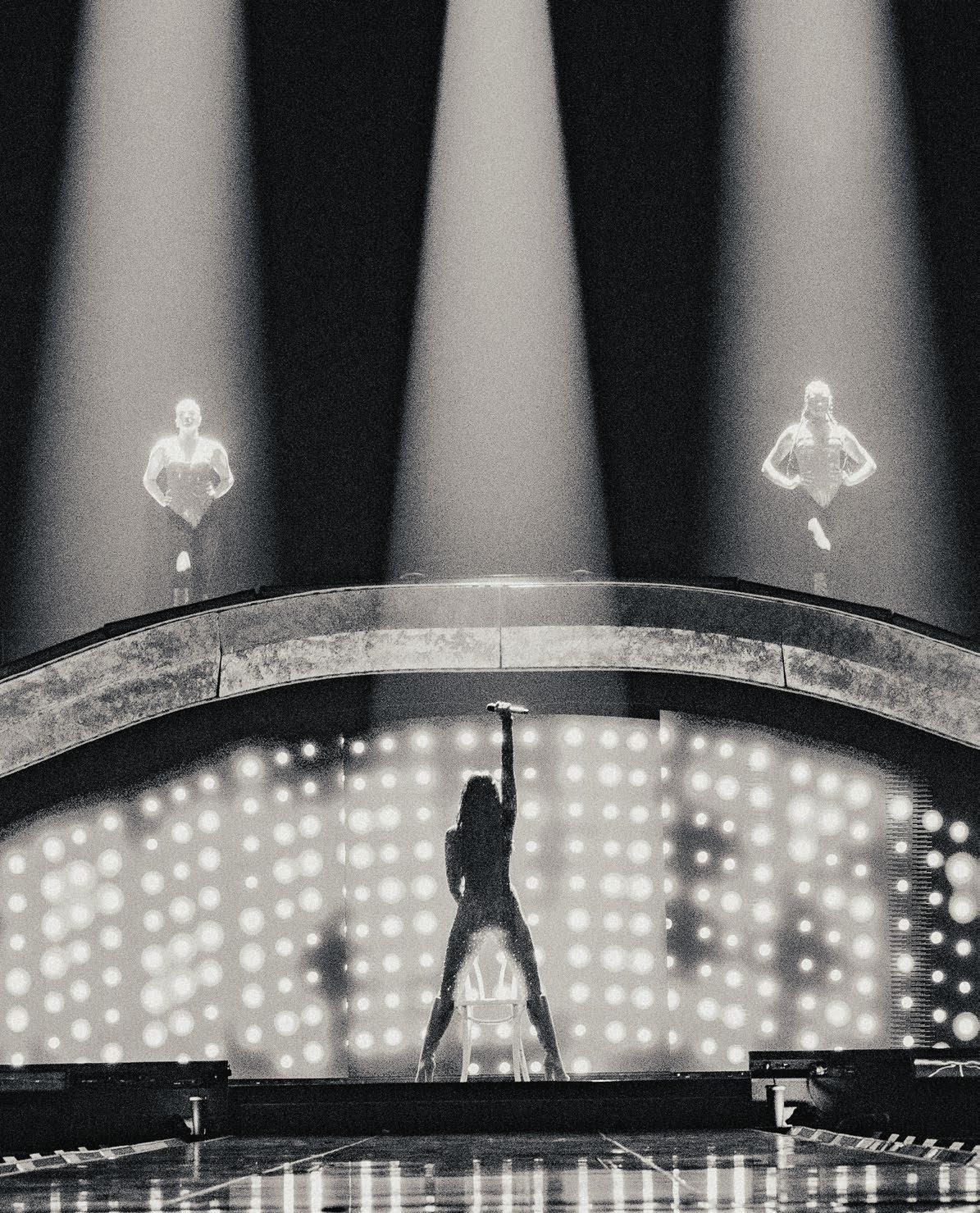
Radical
AGENDA
At the mid-way point of her Radical Optimism world tour, Dua Lipa has been lighting up venues wherever she goes, having completed legs in Asia, Australasia, and Europe. But with her biggest markets still to come later this year – North and South America – the British/Kosovan superstar is taking her music to more fans than ever before. Gordon Masson reports.
The Radical Optimism tour began its European leg in Madrid’s Movistar Arena © Madison Phipps

Being on the road for months on end can be equally exhilarating and exhausting, but while books have been written about touring exploits, there aren’t many acts who can talk about their strategy on dealing with an attempted coup and martial law, enroute.
“Korea was interesting,” understates Dukagjin (Dugi) Lipa – Dua’s father and manager. “I was in my hotel room in Seoul when [tour director] Pete [Abbott] called me at 10pm to ask if I was watching the news. Why would I be watching the news in South Korea? My Korean is not that good. But I turned on the TV to discover we were in the middle of a political coup, and we just had to switch into a different mode.”
As the December 2024 dates in the capital’s Gocheok Sky Dome were the final nights of Dua’s nine-date Asian run, friends and family of the touring party had flown to Seoul to celebrate.
“All of a sudden, we were facing martial law and a curfew, so we needed to make sure everyone was safe,” recalls Dugi. “Because people had flown in their spouses, partners, families, our numbers were 30% more than usual, so the first priority was to gather everybody into our hotel to kind of contain the situation. There were all sorts of considerations – making sure people with medical needs could get access to drugs like insulin, for instance. All sorts of things you’d never usually have to think about. And at the same time, we were having meetings with lawyers, insurance people, the police, the mayor. Being responsible for a lot of people is not a light-hearted matter. And when somebody official tells me ‘It's fine, don’t worry,’ then I need that in writing, which is easier said than done.
“So, Korea was an experience, but luckily, the people of Seoul went to parliament and turned things around peacefully. And the day after martial law had been declared, Dua went on stage. And the atmosphere was electric, on both nights.”
Training Season
That Asian run was a precursor to Radical Optimism’s curtain raiser. “The Future Nostalgia Tour didn't visit Asia because the timing, post Covid, wasn't right,” notes Dugi. “So, we felt that we owed the fans, and that’s why we went to Asia with a set that was a little bit more of Future Nostalgia than Radical Optimism.”
Dua’s touring activity resumed in March, opening an impressive run of five dates in Melbourne. “That was a challenge in itself,” says Abbott, who has been working with the artist since 2016 when she played at an open-mic event in Nottingham’s Rescue Rooms. He continues, “We rolled into the Rod Laver Arena with a 747’s worth of stuff and then added everything else locally. It felt like open rehearsals. They were great shows, but it was like a five-day residency where every morning we’d tweak things based on the night before.”
The show’s design allows the artist to get close to her fans
© Sam Hussein / Getty
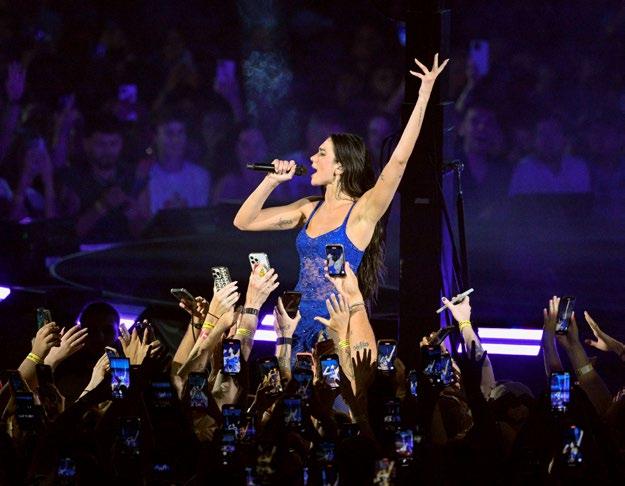
“She has the ability to create an atmosphere where she can connect with the fans in these huge spaces”
Dugi Lipa | Artist Manager
Having scheduled in a tour leg in late 2024, preparations for the current tour began on the road in Asia.
Detailing the process, Abbott describes Dua’s iconic headline performance at Glastonbury Festival as a “hybrid show,” which evolved into the production that then toured Asia. “During the Asia run, we started conversations about The Radical Optimism Tour,” he continues. “Basically, myself and the team at Tait – Slee, Jordan, Bullet – worked through Christmas with Matt Pitman of Pixelmappers, and our set designer, Jason [Ardizzone-West]. Then we had a month in February at Wakefield doing the integration and build process, where Pete Geary, our head carpenter, and [production manager] Ross Maynard put in a lot of stressful days to figure out how to make it work and take it around the world. In parallel, David Black, Charli Davis and the team at Luke Halls Studio were hard at work on the video content, whilst William Bowerman and the team at WFB Live were busy updating the musical direction for the new show.”
Designing a production that can seamlessly jump between arenas, greenfield sites, and stadiums is no mean feat. “It involves three different set-ups, but it’s basically the same set,” says Abbott. “It's different lighting in the stadiums, adapted local lighting at the festivals, and obviously another lighting design for indoor arenas.
The critical thing is that the flow of the show remains constant, so the dancers and the band make some slight modifications for stadiums, but emotionally and physically, it is the same show, which is a good thing in the sense of practicality.”
Providing an insight into the size of the production, he continues, “We’re anywhere between 180 and 200 personnel for arenas. And then we’re 230 to 250 for stadiums. That increase is just somewhat practical on load-in days, where we have lots of extra crew out in the field, but where we’re doing bigger pyro and special effects, it necessitates a bigger crew.”
With the show alternating between indoor and outdoor venues, Abbott discloses, “We cannot look at it as a completely different show – there's just no time to turn that round to the level we’d need to. We have an ensemble on stage of 20 people, including Dua, and that’s what the audience are there to see. So, although it's a big production, we're somewhat less production focused, if that makes sense, while the show itself is the big priority.”
And while Dua’s shows at Wembley Stadium, Anfield Stadium (Liverpool) and Dublin’s Aviva Stadium mark a significant step up at home, her tour director observes that she’s been performing on the biggest stage for some time, elsewhere. “We've done a number of stadium shows in South America, particularly, but also in Asia,” states Abbott.
Thousands of professionals read IQ every day. Make sure you get the whole picture… SUBSCRIBE HERE
SHEER BRILLIANCE
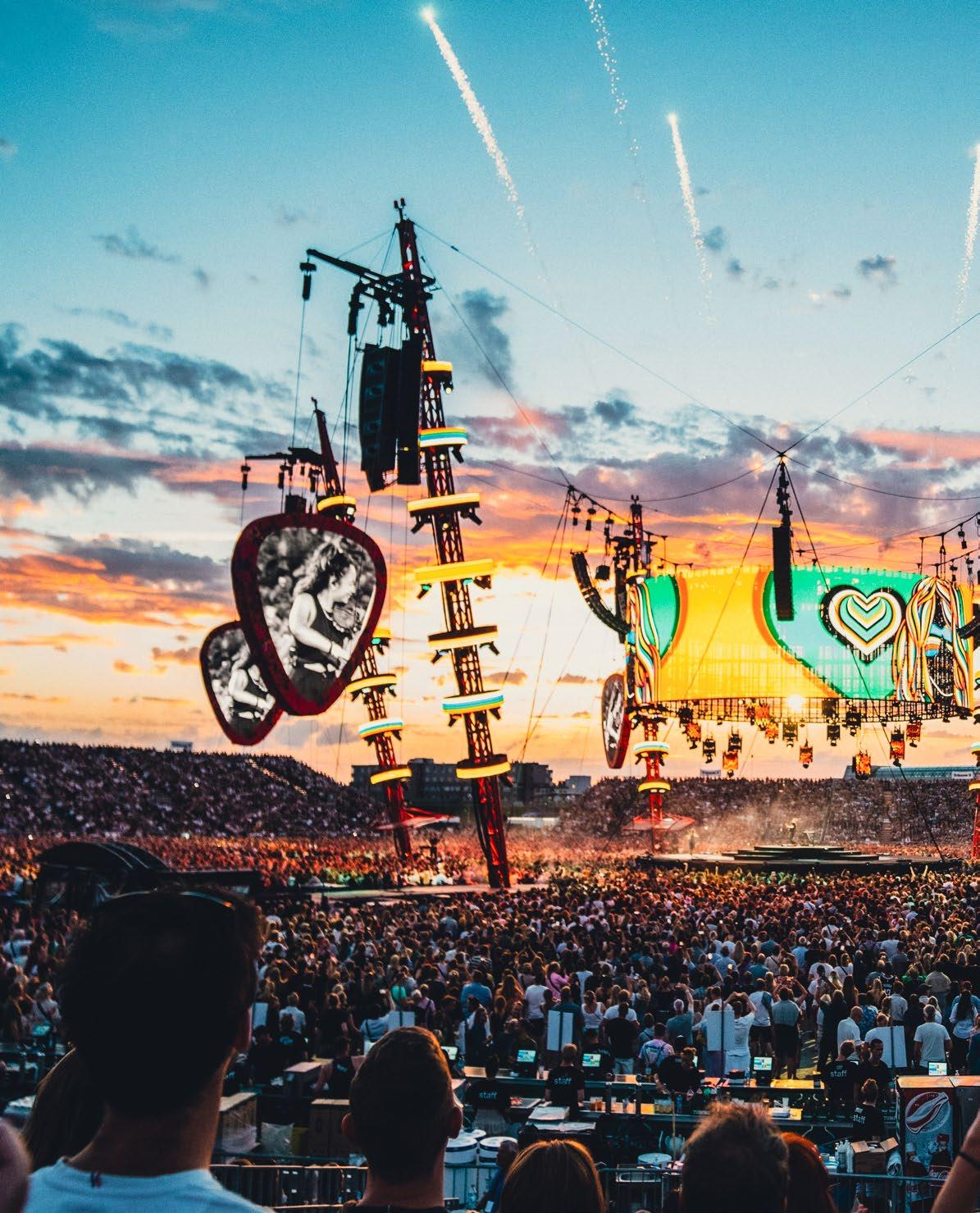
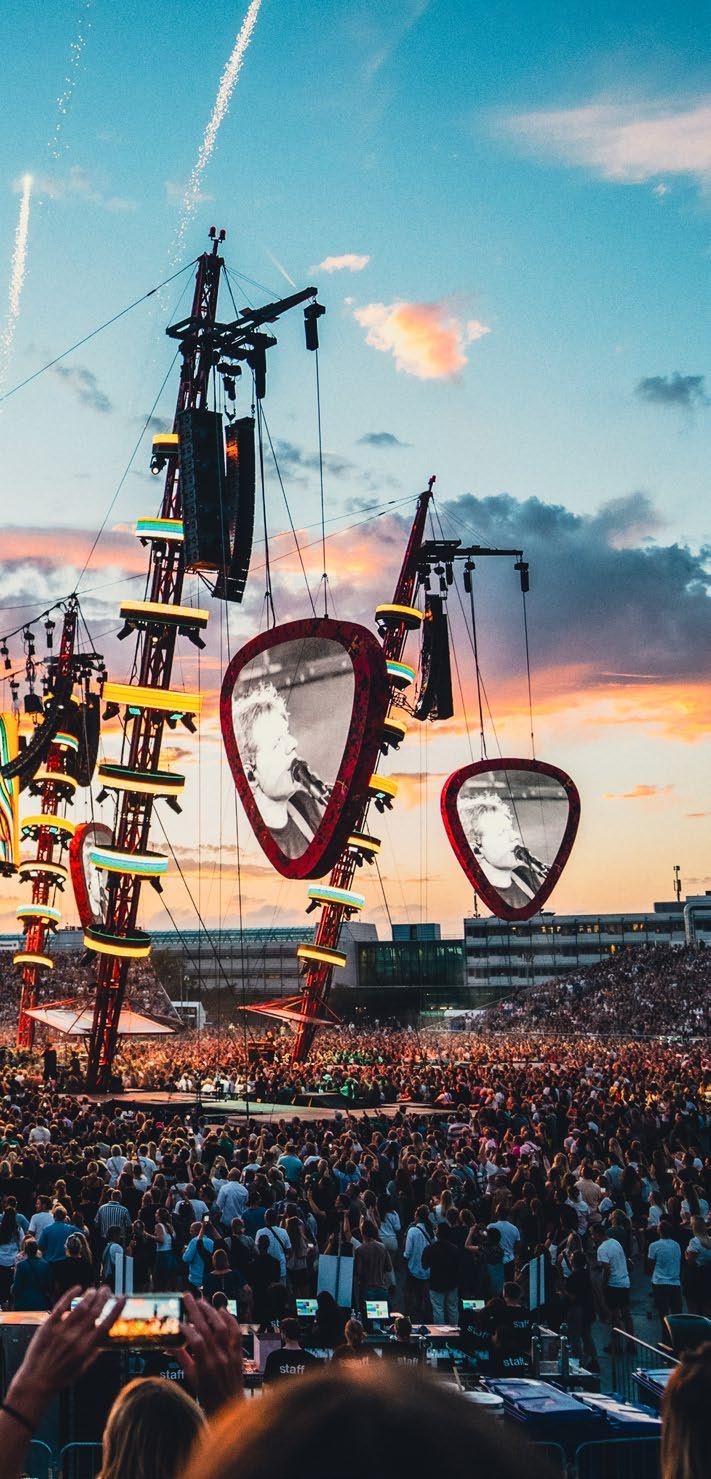


When Ed Sheeran began formulating his retrospective Mathematics Tour, the world around him was at a standstill. When it launched in April 2022 at Dublin’s Croke Park, it heralded the revival of the touring industry as one of the first major tours back out. And when it finishes in September at Düsseldorf’s Merkur Spiel-Arena, it will have sold over 8m tickets across more than 140 headline shows in 42 countries. What Sheeran and his band of collaborators have achieved over this four-year global jaunt has been nothing short of extraordinary.
Coming off the record-shattering Divide Tour, Sheeran and his longtime manager Stuart Camp sat down to discuss what the future looked like. After a hearty round of drinks, the artist revealed plans to take time off touring as his wife Cherry was pregnant. “Weeks later, we went into lockdown,” Camp says.
The concept of an in-the-round show then began to take shape, with the brief from Sheeran simple: “It needed to be absolutely iconic. He wanted it to be something that looks and feels like something nobody else has ever done before,” recalls production director Chris Marsh, who’s worked with Sheeran since 2010.
So the team got to work, wheeling and dealing over video calls and email chains as the world around them shut down. Creative designer Mark Cunniffe had been dreaming of the day of an inthe-round show since Sheeran’s first stadium performance at London’s Wembley Stadium in 2015, and what he concocted fit the bill.
THE FORMULA BEHIND ED SHEERAN’S MATHEMATICS TOUR
Ahead of the expansive Mathematics Tour wrapping up this September in Germany, after four years traversing the globe, Hanna Ellington examines how the sum of its parts have added up to something massive.
“I wanted an unencumbered view of the artist for 360 degrees, which physically hadn’t been done before. I knew it was possible with cable net, but I didn’t know if we could actually tour it. Once we’d done all of our due diligence, we took it to the artist. I said, ‘It’s going to be expensive, but we can do it. We can do this.’ And [he] loved it,” Cunniffe explains.
So, while in the midst of the global shutdown, Sheeran and Camp had to put up the money, to the tune of $25m, for a totally bespoke production, the likes of which had never been achieved before. Though faced with wild uncertainty, Camp affirms it was a project worth pursuing: “If it’s the last show we do, and we only do one, at least they’ll say it was fabulous.”
It was all for the fans, confirms Jon Ollier, Sheeran’s worldwide agent (ex-US/Canada), who’s been with him since 2008. “Ed wanted to take the biggest, most spectacular show he could out on the road. He just wanted to give back to the fans. He was looking at millions and millions of pounds worth of investment to get this thing built, all while in the pandemic, when we never knew if we were going to get to tour it,” says the One Fiinix Live founder and CEO.
Thousands of professionals read IQ every day. Make sure you get the whole picture… SUBSCRIBE HERE
URBAN MITHA
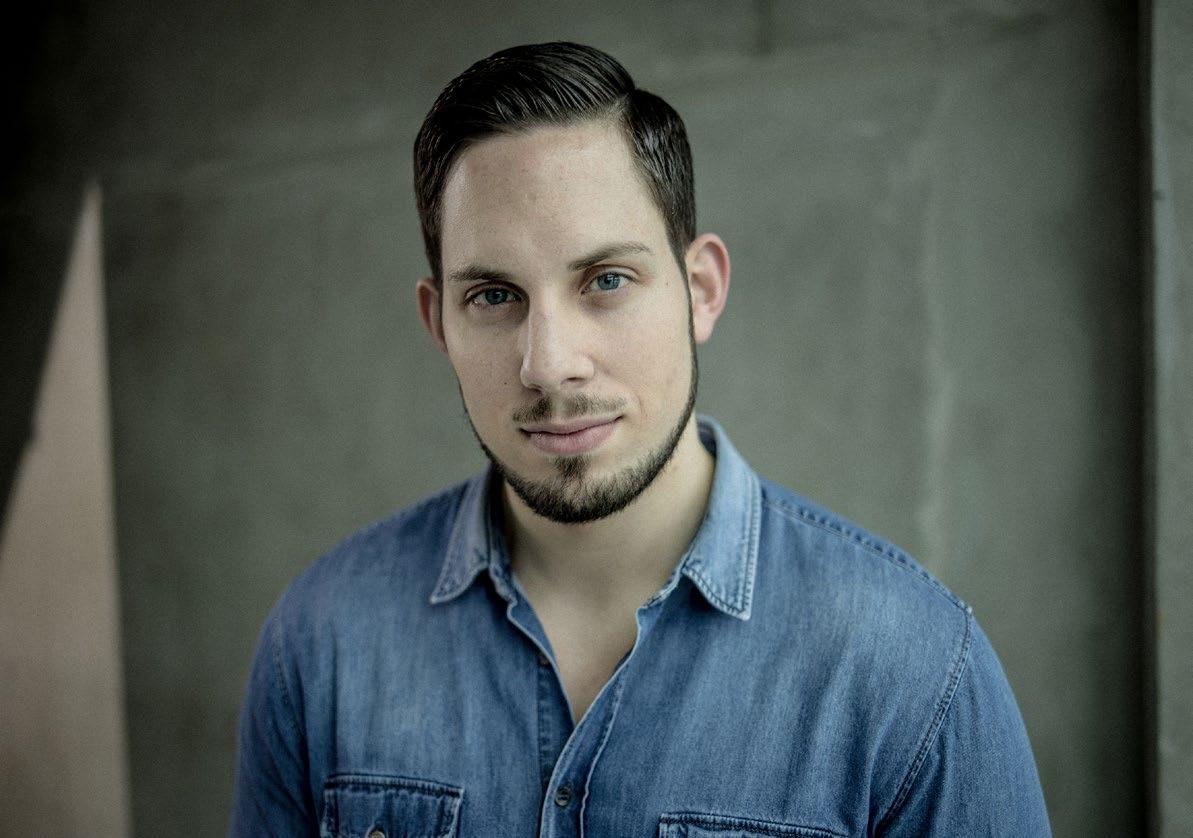
With two decades of professional experience under his belt, Ben Mitha has become one of the biggest independent promoters in Europe’s biggest live music market. Quietly acknowledging this landmark year, here he tells Gordon Masson about his hopes for the future and the constant need to remain creative as he continues to expand his company’s operations across Germany and beyond.
Celebrating the 50th anniversary of the Stadtpark Open Air series of summer concerts, Hamburg native Ben Mitha is leading his company, Karsten Jahnke Konzertdirektion (KJK), into a new era having established a suite of supporting companies under the group’s umbrella since arriving at the firm nearly 15 years ago.
And while he reminisces about last year’s iconic Taylor Swift shows, it’s still some of his
earliest gigs that he flags up as career highlights. “Busta Rhymes was the first show I ever booked, and it remains one of the best for me because I enjoyed every minute, and I realised that I could actually make a career in music,” Mitha tells IQ
Having taken over KJK as CEO in 2021, Mitha has overseen steady growth across the group in the post-Covid years, boosting the number of events the company organises each year and developing its subsidiaries to service the needs of
other clients (as well as internal departments), while also remaining Germany’s most popular local promoter for partners that include conglomerates from both home and abroad.
Last year, for instance, KJK worked with AEG to promote Swift’s historic two-night visit to the Volksparkstadion, but its list of partners includes nearly everyone in the German, Swiss, and Austrian business, and beyond. “We do quite a lot for Live Nation in Hamburg; we do lots for Goodlive; a lot for DreamHaus and PRK; and bits and pieces for United Promoters,” explains Mitha. “Our company promotes around 1,500 shows a year and about 400 of those are local shows in Hamburg. And of those 400, maybe 50 to 100 are our shows – let’s say 25% – and the rest are shows by other German promoters that we put on as local promoter.”
Early Years
Growing up in one of Germany’s most storied musical families, music may well have been in Mitha’s DNA, while his inherent entrepreneurial nature also saw him dabbling in promoting en-
deavours as a teenager when he first started weighing up risk versus reward when it came to his love of hip-hop and urban music.
Indeed, the influence of his grandfather was an ever-present aspect of Mitha’s formative years and well into adulthood. “My mom was 21 when I was born, and Dad was 20, so super young and not in the ideal position to be a responsible father and adult. So my mom pretty much took care of me, with huge support from Karsten and his wife, which meant Karsten was more a father figure in my life than my actual dad was.
“Meanwhile, my mother and grandmother would sell tickets at the box office for concerts. So, from my earliest days I was backstage, and it became my natural habitat: when other kids were in the playground, I’d be hanging out backstage at a Michael Jackson concert.”
He also picked up valuable experience working at the company during school holidays. “In my teenager years, I’d be filing tickets or helping Frehn [Hawel] tidy up the company’s press department. Back then, it was slammed with hardcopy press pictures of all the acts we were promoting, CDs of their music, and physical press releases on paper.”
But company founder Jahnke would also learn from his grandson. “As a kid, I had a good ear for what was happening on the street – what was new and buzzy,” says Mitha. “I’d tell Karsten what music people in school were getting into, so I guess that was my earliest kind of A&R role.”
Developing that tastemaker position among his peers, Mitha started to organise ticketed hiphop parties. “We’d have some pretty big-name DJs, like DJ Fresh,” he recalls. “We’d also get famous domestic artists to team up on sound systems – there’s this huge German rap band called Beginner who did a set for us where we sold over 1,000 tickets, or we had another heritage act in Hamburg called Fettes Brot: the concept was that they would share their musical background by spinning some of their favourite tunes, rather than performing their own hits. It was good fun, and it was nice to have a party business, but the efforts and the profits didn’t really match.”
As a result, the Boom Bash concept was launched when Mitha booked Busta Rhymes for a show at Grosse Freiheit in Hamburg. “I booked a couple of acts as a support bill, and they’ve both developed into arena acts: Kraftklub, who are selling out arenas and headlining big festivals; and Swiss, a local artist who is now performing shows in the 7,000cap region. So it seems I had good taste.”
The Write Stuff
Despite his fledgling success in live music, Mitha’s love for sports was strong, and as a teenager, he dreamed of becoming a sports journalist. “I attended one of the university open days in Hamburg and tried to get into one of the journalism studies lectures. It was held in the university’s
auditorium, and there were 2,200 people packed into the room. It was an eye-opener, as I realised it might be unrealistic to become a successful journalist when there were so many people trying to get a foot in the door.”
As a result, Mitha enrolled in the School of Business Administration. “I thought it might be better to follow Karsten’s footsteps because it seemed like it could be a more fruitful career path than journalism.”
Having taken a year out between school and higher education, Mitha embarked on what would become the first of his many entrepreneurial projects. “I had the time and the energy to work as a stagehand along with a bunch of friends from school who were in the same situation.
“That was the beginning of Digga Events. I’d get the jobs because I was pretty much at the source through Karsten, as well as his suppliers. So I had a bunch of friends working with me and for me, and from word of mouth, more and more people joined.”
Evolving the operation into other areas, Digga became more professional over the years, opening its own offices and maintaining a full-time staff. “These days, Digga has 200 employees and supports around 500 shows a year,” says Mitha. “We are mainly focused on security these days, but we also sometimes still do stagehand jobs or general event planning and event support.”
In addition to Digga, there are multiple organisations under Mitha’s control. But more on those later.
Learning Curve
In early 2008, Mitha found himself on the other side of the Atlantic as an intern at The Kurland
Agency in Boston. “It gave me some experience of the agent side, as well as how business is done in the United States. And then I came back to Hamburg to start my business administration studies.
“The structure of the university was split between lectures and on-site training. So, I’d do two or three months in university, then two or three months at KJK, back and forth. And after three years, I left with two degrees – a bachelor of management arts and a merchant degree for event promotion.”
Having broken into the promoting game with his Busta Rhymes show, it wasn’t long until Mitha learned a valuable lesson. “The first actual tour that I booked myself was for The Game, and I got totally played by the agent,” he reveals. “I still work with that agent, and we are friends, but back then, I wasn’t familiar with how things worked, so when I threw a number out there, he took it as an offer and confirmed the tour. In the end, the shows went well and money wise it was okay-ish, but I learned to be careful what I say to an agent, especially if it is in writing.”
Fortunately, such mistakes have been rare, and Mitha’s ability to introduce new artists to the KJK roster saw him quickly climb the ranks, specialising in the booking of urban acts.
Seven years into his career, he was promoted to MD level, supporting Jahnke in the day-to-day running of the group. “It was tough,” admits Mitha. “A lot of people were sceptical about me, both within the company and in the wider industry. It took a while to convince some people, especially those who had long-term relationships with Karsten.”
Delving into those challenges, Mitha notes, “The way I do business is different from Karsten.
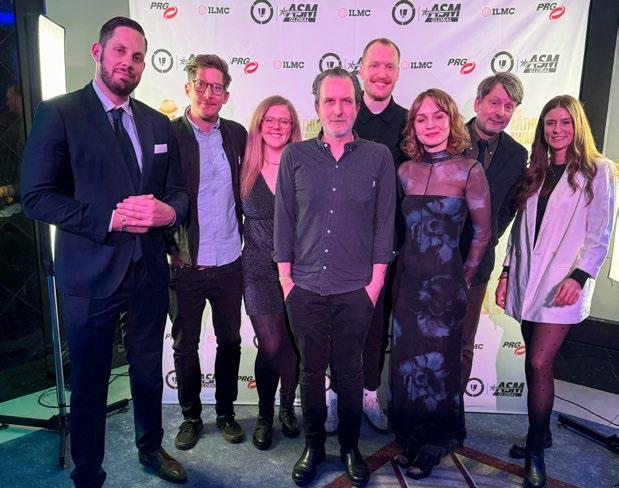
Thousands of professionals read IQ every day. Make sure you get the whole picture… SUBSCRIBE HERE
Mitha with fellow KJ team members at ILMC 2025
REPORT
YOU SHOULD BE DANSKING
As one of Europe’s most vibrant live music markets, Denmark has been a popular destination for touring acts for decades. But now, with domestic talent outselling the outsiders, those working in the country are enjoying a new era of prosperity. Adam Woods reports.

Denmark is still the second-happiest country in the world, according to Gallup’s World Happiness Report. The Danes were just a trace more miserable in 2024 than they were in 2017, the year Finland embarked on an ongoing seven-year run at the top, but overall, they are feeling fine in northern Europe.
In the live business, too, Denmark in 2025 is about the closest thing
you’ll find to an untroubled market.
The year began with a barrage of positive data, as Copenhagen-based research institute Voxmeter tipped Danish venues and festivals to welcome 2.65m fans in 2025 – respectively 3% and 7% up on last year.
Between then and now, the good weather has held, according to Dansk Live director Esben Marcher.
“The overall picture is that most of the Danish festivals are sold out,” he says. “Although there are of course
variations, and some have been sold out closer to the festival than the last couple of years.
“We have no numbers yet, but my impression is that if we focus on festival tickets, this year will set a new standard. Last year, there were a lot of shows in stadiums, so I’m not sure the overall number of outdoor tickets will be as high as 2024, though.”
Of all the European markets, Denmark has been bucking general
trends ever since pandemic conditions lifted. While many countries enjoyed the famous bounce, Danish fans were particularly quick to put their money down for new shows, contrary to the last-minute buying tactics that prevailed elsewhere.
A survey of nearly 16,000 ticket buyers, conducted in summer 2023 by Ticketmaster and Dansk Live, found that 55% of respondents purchase tickets to concerts as soon as they go on sale, while 54% bought

their festival tickets between six and 12 months ahead.
There is also a degree of support from above: at the end of last year, the Danish government launched the kulturpasset for vulnerable young people – a digital payment card worth DKK2,000 (a generous €267.25) to buy tickets to concerts, sporting events, theatres, and museums.
There are underlying economic reasons why Denmark finds itself in a strong position in comparison to
“The local scene is massive and in fierce competition with the international scene when it comes to arenas and stadium-level plays”
Xenia Grigat | smash!bang!pow!
euro, which means that everything is very stable. We try to do all our business at home in Danish krone but abroad in euros, and that creates the stability we need. However, the Swedish and Norwegian currencies are quite weak at the moment, so that has had an effect on business in those places.”
Because the international business knows a hungry, prosperous market when it sees one, Denmark still attracts more than its fair share of major international shows, albeit in a European market in which the big acts are spreading themselves thinner than they once did.
“There’s a lot of traffic this year for a small market like Denmark,” says smash!bang!pow! head promoter Xenia Grigat. “That includes regional cities like Horsens and Aarhus, aside from Copenhagen. From the major productions like Ed Sheeran to Lorde at Royal Arena, Viagra Boys, Hans Zimmer, and Eros Ramazzotti – it’s cross-genre and cross-demographic.”
Copenhagen is Denmark’s biggest city and the inevitable destination for many acts. But the second city, 336,000-strong Aarhus, is a major market in its own right, with locally based DTD Group’s NorthSide festival, Nordic talent showcase SPOT Festival and, down the road in Skanderborg, Smukfest.
gramming. And we see this at our festival, too. We have 60,000 people a day at our site, five days, and we [will sell out], I’m sure, before we reach the festival [in early August].”
All of this combined explains how live accounts for nearly twothirds of the Danish music industry’s DKK16.3bn annual contribution to the economy, according to a report by HBS Economics that was released in May by industry bodies Dansk Live, Gramex, Koda, MXD, Musikforlæggerne, and IFPI Denmark.
The Music Industry’s Contribution to the Danish Economy 2025 concluded that live music, mainly festivals and concerts, generates DKK10.2bn of the industry’s GDP contribution, based on 2023 figures. Live music exports contribute DKK1.1bn to GDP.
Promoters
Rasmus Seebach, Tessa, Thomas Helmig, Benjamin Hav, TooManyLeftHands, Simon Kvamm, and Ude Af Kontrol might not be arena-fillers at an international level, but like Bob Dylan, Drake, Katy Perry, Lorde, Roxette, and globally recognised local rockers Volbeat, they are all headlining their own shows at Copenhagen’s Royal Arena in 2025 and ‘26.
such historically prosperous neighbours as Sweden and Norway, who both find themselves in a tougher spot currency-wise.
“The economy is quite strong here in Denmark, because of the financial policies our government has followed for many, many years,” says Kenneth Svoldgaard of Fanøbased, DEAG-owned producer and booking agency CSB Island Entertainment.
“The Danish krone follows the
Horsens, meanwhile, has form for mega-shows, grabbing Post Malone’s Big Ass Stadium Tour this summer, having welcomed the Rolling Stones, Metallica, Paul McCartney, and many others over the past couple of decades.
“Denmark is incredible,” says Smukfest content manager and executive board member Trine Bang. “We have 100 music festivals, and almost everybody I talk to is talking about good revenue, good sales, and people being excited about the pro -
The rise and rise of local acts has been the major story of the Danish concert business in recent years, and Denmark’s promoters have played a major role in driving the shift, picking up and boosting local artists as a priority.
“Seventeen of 20 artists on the current singles top 20 are Danish artists,” says Grigat. “The local scene is massive and in fierce competition with the international scene when it comes to arenas and stadium-level plays.”
The latter trend found its fullest expression in 2024, when Live Na-
Thousands of professionals read IQ every day. Make sure you get the whole picture… SUBSCRIBE HERE
Danish rock band Volbeat are regular visitors to the capital’s Royal Arena © Morten Rygaard
Forty years on, what are your memories of Live Aid and its lasting impact?
TOP SHOUT
My memories: Friday night – at 9.00pm the turntable stage packed up; went to Wembley with four crates of cold beer to placate the crew, who were exhausted; fixed the problem and went to bed.
Saturday morning – woke up at 7.30am and the sun was shining; arrived at Wembley at 9.00am and sent off the crew to buy 40 clocks – placed them everywhere backstage, including one round my neck with a message that said, “I don’t care what time you go on, but I do care what time you come off. Please stick to time.”
David Bowie dropped a number to show NBC’s video of the famine to the Cars song Drive, after which the money came flowing in.
End of show – Bob [Geldof] and I sitting on a drum riser on stage looking at all the rubbish as it was being collected, and said, “IS THAT IT?”
Harvey Goldsmith CBE
What I’ve seen over the last 40 years is the awakening of the social conscience of the music industry, with artists realising they had a power and they could do good with that power. We saw Bono, Sting, Roger Waters using their voice, their position, and their platform to push for causes they believe in. It would change people’s perspective of charity and mobilise public opinion to such an extent that government policies in the developing world and other areas would be altered thereafter.
You can look back at Live Aid and see that’s
where it started. Governments now listen, and that all started with a pop concert.
Andrew Zweck | Sensible Events (and Live Aid production manager)
To be perfectly honest, I was never sure that it was going to happen. I only realised at the last minute when Bob [Geldof] kept calling and thought it would be a great idea for Alison Moyet and Paul Young to duet – but they couldn’t agree any of the ideas put forward.
The feeling, though, in that stadium when Sta-
tus Quo went on – it sent a shiver up the spine… a magic moment never to be repeated – something to tell your grandchildren.
John Giddings | Solo Agency
I was Nik Kershaw’s guitar tech at Live Aid. Nik’s crisp guitar sound came from a very hi-tech racked Dean Markley amp and FX system with speakers off-stage, mic’d up in a sealed box and fed back to him through the monitor system, with nearly all of Nik’s foldback coming through the wedges on the front edge of stage – not on the revolve, so they couldn’t be checked till after we’d spun into position.
Spandau Ballet finished and we were spun into position to do our final checks while Elvis Costello was playing an acoustic number. I still hadn’t heard any guitars. Elvis finished and we got the monitor system. Still no guitars.
I yelled across to Steve Levitt behind the board, “I still don’t have any f**king guitar, Lev! I can’t let him onstage like this…” when there was a tap on my shoulder. I turned to find the band in place on their risers and Nik standing beside me with a pained grin on his face. I handed over the guitar, and as I ran off, stage left, he started Wide Boy with no guitar or vocal in the monitors – unable to hear anything. He came off thinking he’d played the worst gig of his career, but when you listen back, you’d never know.
Wob Roberts | Production Manager
Ticketron sold the Live Aid tickets for the 13 July concert, and in 1985, I was working at Ticketron’s New England office as a senior client executive. So, I was able to buy two tickets and went with my college mate.
Absolute highlights included Led Zeppelin’s Rock and Roll/ Whole Lotta Love, Mick and Tina’s It’s Only Rock ’n’ Roll, and Phil Collins’ sets in both London and Philly to complete the two continent daily double!
The event was a musical highlight that I shall always cherish.
Brian Kabatznick | Oak View Group
My budgie, June, flew away the day of Live Aid. I was pretending to be Freddie Mercury – a sweeping brush my microphone. I accidentally hit the cage with it, the door flew open, and June flew off into the sunset, leaving me devastated as her partner, Terry, had passed away a few months before.
I hope she’s having a nice life somewhere hot – Limerick was too cold for her anyway. She’ll be 42 now, probably with a nice family of her own. I’ll never forget June...
Suzanne Moloney | ITB
Thousands of professionals read IQ every day. Make sure you get the whole picture… SUBSCRIBE HERE


